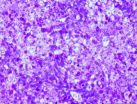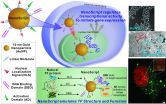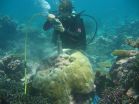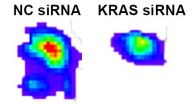Oxytocin helps to better overcome fear
Researchers at the University of Bonn Hospital show that the bonding hormone inhibits the fear center in the brain
2014-11-13
(Press-News.org) Frightening experiences do not quickly fade from memory. A team of researchers under the guidance of the University of Bonn Hospital has now been able to demonstrate in a study that the bonding hormone oxytocin inhibits the fear center in the brain and allows fear stimuli to subside more easily. This basic research could also usher in a new era in the treatment of anxiety disorders. The study has already appeared in advance online in the journal "Biological Psychiatry". The print edition will be available in a few weeks.
Significant fear becomes deeply entrenched in memory. Following a car accident, for example, it is difficult to manage street traffic once again - even screeching tires can evoke significant anxiety. Scientists refer to this as "conditioning". Certain images or noises are very closely intertwined in the brain with the experience of pain or fear. Only gradually does one learn that not every screeching tire means danger. This active overwriting in the memory is known as "extinction". "In this process, however, the original contents of the memory are not erased but instead merely overlaid with positive experiences," explains Prof. Dr. Dr. René Hurlemann from the Department of Psychiatry and Psychotherapy of the University of Bonn Hospital. If there are dangerous situations once again, the fear, which was believed to have been already overcome, frequently flares up once more.
Extinction is often used in therapy for anxiety disorders. For example, a person suffering from a spider phobia will gradually and increasingly come face to face with spiders. First the patient has to view photos of spiders and then look at living examples until finally he holds a tarantula in his hand. When people with an anxiety disorder experience as frequently as possible the fact that they do not need to fear the trigger, their fear is reduced. "However, this can take a very long time, because this confrontation with the fearful situation frequently has to be experienced. In addition, there may be relapses because the original trace of fear is still anchored in the memory," reports Prof. Hurlemann. This is why therapists seek a possibility for "overwriting" the fearful memory in a faster and longer-lasting way.
Oxytocin facilitates overwriting of fearful experiences
It has been known for a long time that the hormone oxytocin does not just have a bonding effect in the mother-child relationship and in the case of sex partners but that it is also considered to be anxiolytic. The scientists at the Department of Psychiatry and Psychotherapy at the University of Bonn, together with their colleagues from the German Cancer Research Center in Heidelberg and the University of Chengdu (China) have now been able to prove its helpful effect in overwriting fearful experiences. "Oxytocin actually reinforces extinction: Under its influence, the expectation of recurrent fear subsequently abates to a greater extent than without this messenger," says study director Prof. Hurlemann, summarizing the result.
The team of scientists induced fear conditioning in a total of 62 healthy male subjects. In the brain scanner, using video glasses, the test subjects viewed photos, for example of human faces. For 70 percent of the images, they received a very brief, unpleasant electrical shock to the hand via electrodes. "In this way, certain images were associated with an experience of anxiety in the test subjects' memory," explains Prof. Hurlemann. The scientists used two methods to prove that this pairing of a particular photo and pain was actually anchored in the test subjects' brains: The expectation of an electrical shock was demonstrated by increased cold sweat which was measured via skin conductivity. In addition, the brain scans prove that the fear regions in the brain were always particularly active.
Half of the test subjects received oxytocin via a nasal spray. The rest received a placebo. Then the extinction phase began in which the test persons were shown the same pictures several times as before but they no longer received electrical shocks. In the men under the influence of oxytocin, the amygdala, as the fear center in the brain, was overall far less active than in the control group, whereas fear-inhibiting regions were more stimulated. Over time, the messenger caused the fear to initially be somewhat greater but then it abated to a far greater extent than without oxytocin. The scientists explain this through the special effect of the messenger: "Oxytocin initially reinforces the test subjects' conscious impressions and thus the reaction to the electrical shock, yet after a few minutes, the anxiolytic effect prevails," explains Prof. Hurlemann.
The scientists hope that anxiety patients can be helped more quickly with the aid of oxytocin and that a relapse can be better prevented. In addition, the researchers presume that the hormone likely facilitates bonding between the therapist and the patient and thus the success of the treatment. "However, this must first be demonstrated by clinical studies," says the scientist from the University of Bonn Hospital.
INFORMATION:
Publication: Oxytocin Facilitates the Extinction of Conditioned Fear in Humans, "Biological Psychiatry", DOI: 10.1016/j.biopsych.2014.10.015
Media contact information:
Prof. Dr. Dr. René Hurlemann
Department of Psychiatry and Psychotherapy of the University of Bonn Hospital
Tel. ++49-(0)228-28719124
Email: r.hurlemann@gmail.com
ELSE PRESS RELEASES FROM THIS DATE:
2014-11-13
The liver stores excess glucose, sugar, in the form of glycogen--chains of glucose--, which is later released to cover body energy requirements. Diabetic patients do not accumulate glucose well in the liver and this is one of the reasons why they suffer from hyperglycemia, that is to say, their blood sugar levels are too high. A study headed by Joan J. Guinovart at the Institute for Research in Biomedicine (IRB Barcelona) demonstrates that high hepatic glucose stores in mice prevents weigh gain. The researchers observed that in spite of having free access to an appetizing ...
2014-11-13
PISCATAWAY, N.J. (November 13, 2014) - Rutgers University Chemistry Associate Professor Ki-Bum Lee has developed patent-pending technology that may overcome one of the critical barriers to harnessing the full therapeutic potential of stem cells.
One of the major challenges facing researchers interested in regenerating cells and growing new tissue to treat debilitating injuries and diseases such as Parkinson's disease, heart disease, and spinal cord trauma, is creating an easy, effective, and non-toxic methodology to control differentiation into specific cell lineages. ...
2014-11-13
(Boston) - The Alzheimer's drug memantine may perform double-duty helping binge eaters control their compulsion. Researchers have demonstrated that memantine, a neuroprotective drug, may reduce the addictive and impulsive behavior associated with binge eating.
The Boston University School of Medicine (BUSM) study, which appears online in Neuopsychopharmacology, also found that a specific area in the brain, the nucleus accumbens, which is responsible for addictive behaviors, facilitates the effects of memantine.
Binge-eating disorder is a prevalent illness in America, ...
2014-11-13
The Earth's oceans are thought to have taken up about one quarter of the carbon dioxide (CO2) that humans pumped into the atmosphere in the past 2 decades. While this drives acidification and has consequences for sea life, it also moderates the rate of climate change.
Researchers recently set out to create a global model of CO2 uptake using fine-scale observations on a global scale. Between 1998 and 2011, they found strong interannual variations, with the Pacific Ocean dominating the global flux variability.
"Shipboard surface water CO2 measurements are the backbone ...
2014-11-13
The ocean is warming steadily and setting up the conditions for stronger El Niño weather events, a new study has shown.
A team of US, Australian, and Canadian researchers sampled corals from a remote island in Kiribati to build a 60-year record of ocean surface temperature and salinity.
"The trend is unmistakeable, the ocean's primed for more El Niño events," says lead-author Dr Jessica Carilli, now based at the University of Massachusetts, Boston.
Team member Dr Helen McGregor from the Research School of Earth Sciences at The Australian National University ...
2014-11-13
HOUSTON - (Nov. 13, 2014) - While feelings of disgust can increase behaviors like lying and cheating, cleanliness can help people return to ethical behavior, according to a recent study by marketing experts at Rice University, Pennsylvania State University and Arizona State University. The study highlights the powerful impact emotions have on individual decision-making.
"As an emotion, disgust is designed as a protection," said Vikas Mittal, the J. Hugh Liedtke Professor of Marketing at Rice's Jones Graduate School of Business. "When people feel disgusted, they tend to ...
2014-11-13
Half a million objects, including debris, satellites, and the International Space Station, orbit the planet in the thermosphere, the largest layer of Earth's atmosphere. To predict the orbits--and potential collisions--of all this stuff, scientists must forecast the weather in the thermosphere.
Researchers who analyzed the role that gravitational effects of the Moon have on the thermosphere found that satellites taking different paths around the planet--circling over the poles, around the equator, or any route in between--will experience different levels of lunar-induced ...
2014-11-13
CHAPEL HILL, NC - Researchers from the UNC School of Medicine and colleagues at The University of Texas MD Anderson Cancer Center have developed a new approach to block the KRAS oncogene, one of the most frequently mutated genes in human cancer. The approach, led by Chad Pecot, MD, an assistant professor of medicine at UNC, offers another route to attack KRAS, which has proven to be an elusive and frustrating target for drug developers.
The new method relies upon a specifically sequenced type of small interfering RNA - or siRNA. The findings, published in the journal ...
2014-11-13
Irvine, Calif., Nov. 13, 2014 -- A new bloodstream infection test created by UC Irvine researchers can speed up diagnosis times with unprecedented accuracy, allowing physicians to treat patients with potentially deadly ailments more promptly and effectively.
The UCI team, led by Weian Zhao, assistant professor of pharmaceutical sciences, developed a new technology called Integrated Comprehensive Droplet Digital Detection. In as little as 90 minutes, IC 3D can detect bacteria in milliliters of blood with single-cell sensitivity; no cell culture is needed.
The work appears ...
2014-11-13
The Sudbury Basin located in Ontario, Canada is one of the largest known impact craters on Earth, as well as one of the oldest due to its formation more than 1.8 billion years ago. Researchers who took samples from the site and subjected them to a detailed geochemical analysis say that a comet may have hit the area to create the crater.
"Our analysis revealed a chondritic platinum group element signature within the crater's fallback deposits; however, the distribution of these elements within the impact structure and other constraints suggest that the impactor was a comet. ...
LAST 30 PRESS RELEASES:
[Press-News.org] Oxytocin helps to better overcome fear
Researchers at the University of Bonn Hospital show that the bonding hormone inhibits the fear center in the brain



